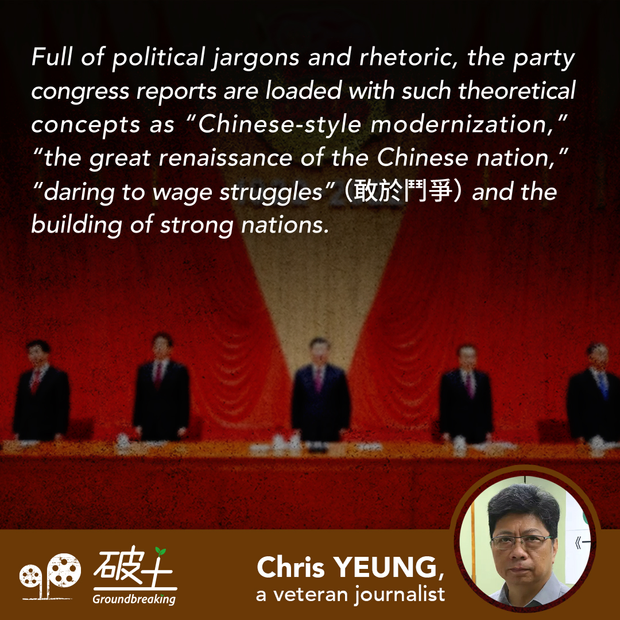As CCP talks tough, Hong Kong feels the heat

Jiang Enzhu(姜恩柱), the first head of China’s Liaison Office in Hong Kong after the 1997 handover, once remarked the city is a difficult book to read and understand. Though a key mainland official involved with Hong Kong’s transition, Jiang – and indeed his bosses in the Chinese Communist Party – had been humble when it came to Hong Kong affairs.
Mindful of sharp differences between the mainland’s socialist systems and the city’s capitalist systems, they knew well the best way to prolong the success story of Hong Kong was to take their hands off – and keep their mouths shut. Jiang walked the talk by being a quiet reader of the Hong Kong book during his five-year stint in the city, which ended in 2002.
To most Hong Kong people, the Chinese Communist Party is an even more difficult book to read and understand. It is indeed a book they did not need to read under the political framework of “one country, two systems.” What the party decided at their five-yearly congresses had little direct impact on the city’s developments until the past decade or so.
And even if some did want to know, they had no way to get a hand of the party’s operation in the former British-ruled enclave. The operation of the ruling party has been wrapped in secrecy to avoid stirring up the feeling of communist-phobia.
This is despite the fact that the communist government’s presence in the city has become increasingly felt since the watershed 500,000 strong march in 2003. The CCP book remains difficult to read and understand. But its relevance to the city’s future has markedly grown.
Following the closure of the party’s landmark 20th national congress in Beijing on October 22, leaders of provincial governments and departments have held study sessions on the spirit of the 20th party congress. It should not come as a surprise that SAR leaders will soon join senior cadres across the mainland to learn from the just-concluded congress for guiding lights on their developments in the next five years.
There is no shortage of reminders of the difficulty of getting to know more about the CCP. The drama unfolding at the podium of the Great Hall of the People at the closing session of the party congress is an eye-opener to China-watchers and Hongkongers.
Many reacted with shock and awe to a short video of the sudden departure of Hu Jintao, the ailing former party general secretary sitting next to Xi Jinping, from the podium when the session was half-way through, which ran viral on social media. Pundits have tried hard to read between the footage to find out what happened at the podium and what may have happened behind the scenes.
Conspiracy theorists saw it as a sign of a red-hot power struggle at the senior echelon of the ruling party – and a looming ugly power fight. The official Xinhua news agency said in a despatch Hu was just feeling unwell. Believe it or not.
Whether it was a political health problem is anybody’s guess.
What is certain with no doubts whatsoever is the longevity of Xi’s rule, now into its 11th year. Never mind how he has amassed his power and support from the elites of the party and the 1.4 billion populace at large.
Now that the next chapter of the Hong Kong book is tied with the fate of the CCP, Hong Kong people have to look for clues and pointers of the way ahead for the city from the spirit and text of the party’s documents.
Full of political jargons and rhetoric, the party congress reports are loaded with such theoretical concepts as “Chinese-style modernization,” “the great renaissance of the Chinese nation,” “daring to wage struggles”(敢於鬥爭) and the building of strong nations.
Despite repeated pledges of Deng Xiaoping’s “reform and open door policy” in Xi’s report, there is a clear shift towards the vital importance of upholding national security and “waging struggles”(鬥爭)against both domestic and foreign enemies.
The party’s tough talk on “struggles” and its march towards the status of a strong nation in the next decade has stoked fears of adding more strain to the uneasy ties between China and Western countries.
Being an international city and a Special Administrative Region of China, Hong Kong has and will slip deeper into the increasingly precarious external environment.
The plain truth is that Hong Kong will not possibly be able to stay unharmed if and when China comes into conflict with Western countries over a host of political, economic and security issues.
Nor Hong Kong will be able to tell its good story and tell it well if it no longer has its own story, but an odd episode in the story of growing rivalry of China with a major bloc in the world.
▌[At Large] About the Author
Chris Yeung is a veteran journalist, a founder and chief writer of the now-disbanded CitizenNews; he now runs a daily news commentary channel on Youtube. He had formerly worked with the South China Morning Post and the Hong Kong Economic Journal.